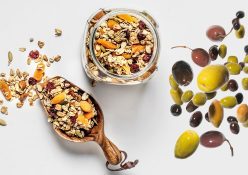Forget diet fads and fat freezing – these tips will help you burn fat in the healthiest ways possible
For most of our lives, weight loss has been the ultimate goal. The culture surrounding the extra amount of fluff on our bodies has almost been weaponised to a point where, even today in a body positive society, we’re still being bombarded with every weight-loss tactic out there. That’s not to say fat loss is something no one should aspire to, but rather something that we achieve to benefit ourselves – not those around us. And, better yet, there are healthy and natural ways to burn fat that don’t have to involve the jelly diet, liquid cleanses, or limiting yourself to protein shakes for months on end. Anything that starts to feel too restrictive is only heading for disaster, so we’re here to help you break it down.
The Basics of Fat Burning
When trying to lose weight, you should be aware of how your body uses calories for fuel. The general rule is that you get your energy from carbohydrates, protein, and fat. Naturally, the majority of people want to use fat for energy. You work out that the more fat used for fuel, the less fat you will most likely have in your body. In truth, using more fat for fuel doesn’t necessarily mean that you will lose more fat. Your body mainly uses fats and carbohydrates for fuel. When you’re exercising, a small amount of protein is released, but it’s mostly used to heal muscles after exercise. How these fuels are used most likely depends on the type of activity you’re doing. For higher-intensity exercises, your body will use more carbohydrates than fat for fuel. For less intense and longer exercise, fat is used for more fuel than carbs. The bottom line is that if you want to lose weight, the fuel you use doesn’t particularly matter. What matters is how many calories you burn versus how many calories you take in.
1. The Microbiome Diet
The ‘microbiome’ refers to the group of microorganisms existing in your intestines. These microorganisms comprise of fungi, bacteria and archaea. Therefore, having a variety of beneficial gut flora promotes a person’s good health. But gut flora can become less beneficial for a number of reasons. So, the microbiome diet attempts to improve the microbiome and your overall health. Looking after your microbiome can decrease inflammation, improve brain function, and support the immune system. In addition, taking care of microbes in your gut could control your metabolism and mood. To have a healthy microbiome, the ‘good’ bacteria in your gut has to be supported and urged on to become a diverse microbial collection. Eating nutrient-dense meals by having at least half your plate filled with vegetables, consuming probiotic foods or supplements, eating fibre-rich foods and restricting alcohol all contribute to a healthy gut, which aids in burning fat.
2. Semaglutide Injection
The United States Food and Drug Administration (USFDA) approved the once-weekly semaglutide injection for chronic weight management in adults with obesity, or for those who are overweight and have at least one weight-related condition. Semaglutide is the first approved medication for chronic weight management in overweight or obese adults. It helps in balancing hormones such as insulin, which could suppress one’s appetite and promotes weight loss by eating less. Semaglutide can be administered orally, or by injection. While the side effects are mild, there have been some concerns raised about its safety for long-term use.
3. Eat More Protein
Consider adding more protein to your breakfast; this will keep you full for longer and help stomp out the urge to consume high-calorie foods while waiting for your next meal. Foods such as dairy, eggs, lean meat, seafood and tofu all help in controlling hunger. Plus, your body uses more energy when digesting protein – an added bonus.
4. Fibre, Fibre, And More Fibre
More fibre from foods like wholegrains, fruits, vegetables, beans, lentils, and nuts all keep you full and feeds the healthy bacteria in your gut. Adding more fibre to your daily meals helps to regulate your blood glucose levels, which are typically related to hunger.
5. Eat During Windows
Your body can process foods more effectively earlier in the day. Thus, consuming foods at night could make it harder to control your weight because the insulin hormone doesn’t function as well. On the other hand, not eating enough during the day could cause you to overeat at night, which could make weight management more difficult as you are consuming more calories. Curbing eating in the night could be the difference between gaining or shedding those extra kilos. When it comes to burning fat, you have to be committed to putting in the work. Unfortunately, there is no overnight workout, diet or pill that does it for you – no matter how promising it sounds. The good news is that if you try and incorporate some activity into your daily routine and build on that over time, you’ll be well on your way to burning more fat.
Words by Leah Dennis







